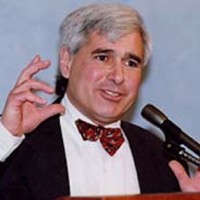Why should businessmen read great literature?, by Vigen Guroian
In every society, power must be humanized and used morally in order that free and civilized life might prosper. And in a commercial society, businessmen and businesswomen wield especially great power and are frequently called into roles of civic and political leadership. This fact makes the question that serves as this essay’s title especially significant. A half-century ago, Russell Kirk, author of The Conservative Mind, penned an article titled “The Inhumane Businessman.” Kirk did not argue that businessmen are, as a lot, more inhumane, mean, or cruel than the average bank clerk, schoolteacher, or construction worker. But he was persuaded that businessmen are “deficient in the disciplines which nurture sound imagination and strong moral character,” and that this does not augur well for the nation.
Kirk lamented the turn to business education in our colleges and universities, which, he argued, contributes to the cultural illiteracy of the business class. This trend toward specialized business education accelerated during the concluding decades of the twentieth century, leaving fewer and fewer of those engaged in business educated in the liberal arts. That is a principal reason why businessmen so often do not read great literature. So this is where I shall begin.
Imagining larger possibilities and purposes
Kirk was right. By the 1950s, higher education in North America had begun to buy into business education, so to speak, and replace liberal studies with this glamorized version of vocational training. Colleges certainly did not heed C. S. Lewis’s admonition that “if education is beaten by training, civilization dies.” Even earlier in the century, G. K. Chesterton published an article in the London Illustrated Times, titled simply enough “On Business Education,” in which, in his acerbic manner, he summed up the scandal and hinted at its consequences: “Modern educators begin by stuffing the child, not with the sense of justice by which he can judge the world, but with the sense of inevitable doom or dedication by which he must accept that particular very worldly aspect of the world.”
For many years, I taught core curriculum courses in ethics, literature, and theology at a college in which more than a third of the students were business majors. And I saw over more than twenty years how business “training” sucked these students dry of idealism and replaced it with the crudest forms of pragmatism, utilitarianism, and fatalism. The light in their eyes had already begun to dim and flicker before they had finished their fourth year, a dreadful thing to witness. Despite my efforts and those of other teachers in the humanities, many men and women departed the college with no sense of the meaning or value of a liberal arts education. Nor had they acquired the habits of reading that are historically associated with such an education. I have reason to believe that this is not an isolated phenomenon; experience elsewhere since then suggests that it is equally true of business school students around the nation.
This deficiency is debilitating in ways that are wholly overlooked by much of society, including the parents of my students. For if these young men and women learned the meaning and value of the liberal arts, they would leave college with the answers to two questions that, as it turns out, they hardly know how to ask, let alone answer. First, “Why should I read great literature throughout the rest of my life?” Second, “Why am I choosing to spend my life in business?”
They cannot answer the second question satisfactorily because they are not encouraged in college (or even permitted, in many cases) to read and love the great literary masters. Aristotle, Dante, Shakespeare, Dostoevsky, and Eliot teach us to imagine larger possibilities and purposes for our lives. They test our decisions with the moral wisdom of humankind. They ask us to move through the world with discernment. They show us that we possess the freedom to make of our lives what we will and not what others choose for us, what the fates decide, or what historical forces dictate.
Read the complete article in The Clarion Review
